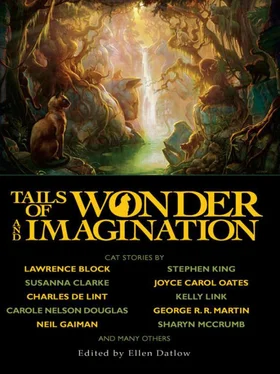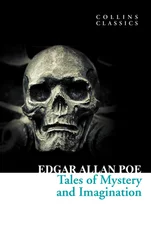Ellen Datlow - Tails of Wonder and Imagination
Здесь есть возможность читать онлайн «Ellen Datlow - Tails of Wonder and Imagination» весь текст электронной книги совершенно бесплатно (целиком полную версию без сокращений). В некоторых случаях можно слушать аудио, скачать через торрент в формате fb2 и присутствует краткое содержание. Год выпуска: 2010, ISBN: 2010, Издательство: Night Shade Books, Жанр: Фэнтези, Фантастика и фэнтези, Ужасы и Мистика, на английском языке. Описание произведения, (предисловие) а так же отзывы посетителей доступны на портале библиотеки ЛибКат.
- Название:Tails of Wonder and Imagination
- Автор:
- Издательство:Night Shade Books
- Жанр:
- Год:2010
- ISBN:978-1-59780-170-6
- Рейтинг книги:5 / 5. Голосов: 1
-
Избранное:Добавить в избранное
- Отзывы:
-
Ваша оценка:
- 100
- 1
- 2
- 3
- 4
- 5
Tails of Wonder and Imagination: краткое содержание, описание и аннотация
Предлагаем к чтению аннотацию, описание, краткое содержание или предисловие (зависит от того, что написал сам автор книги «Tails of Wonder and Imagination»). Если вы не нашли необходимую информацию о книге — напишите в комментариях, мы постараемся отыскать её.
collects the best of the last thirty years of science fiction and fantasy stories about cats from an all-star list of contributors.
Tails of Wonder and Imagination — читать онлайн бесплатно полную книгу (весь текст) целиком
Ниже представлен текст книги, разбитый по страницам. Система сохранения места последней прочитанной страницы, позволяет с удобством читать онлайн бесплатно книгу «Tails of Wonder and Imagination», без необходимости каждый раз заново искать на чём Вы остановились. Поставьте закладку, и сможете в любой момент перейти на страницу, на которой закончили чтение.
Интервал:
Закладка:
I paid my euros, joined a queue again, of people in padded jackets and woolly hats, usually with technicolour plaits attached, a fashion that was no doubt practical but too hippie for my tastes. Inside was warmth again, and our guide.
The bi-lingual tour was detailed, but told with a light, witty touch. I learnt about the Hanseatic league, Bremen as republic, Bishop Ansgar who evangelized Scandinavia from Bremen, about 1000 years ago. And Sydney town is only two hundred years old, I thought, unless you are Yothu Yindi.
Interesting though the tour was, odd details kept distracting me: the dog that padded along with the tour, as if it too had paid its euros to attend, a gargoyle face squinting from a riot of wooden carving, the wry, nasal laugh of the guide…
“Someone has just asked me about the symbol of the city, the key. It was not like now, where keys of the city are given as honours. Not a symbol of opening, but closure. Medieval cities were walled, against what might attack them from outside the zone of tilled fields and pasture, from robbers to robber barons. The keys were closely guarded, for behind the walls were not tolerant places. They had to be that way, to survive.”
I looked properly at the guide for the first time. He was large, male, graying, about my vintage, nondescript almost by intention, as if trying to fit in as precisely as a jigsaw piece.
“Since you’re talking about symbols, what about the musicians of Bremen?” I asked.
It was as if the rest of the tour group had vanished, and we were just talking to each other one to one, as we had in the plane.
“They never got here,” he said. “They got diverted.”
“By the lights of a house in the forest,” I breathed.
“And when they looked in the window…”
“They saw firelight and robbers, feasting around a table.”
“Their mouths started watering, with the hunger.”
“And they slunk back into the dark.”
“Discussed what to do.”
“And devised a plan.”
“They watched and waited until the robbers were drunk, but not legless.”
“Then the donkey sank down on his knees, and the dog scrabbled onto his back.”
“The cat elegantly leapt onto the back of the dog from her vantage point on a water barrel.”
“The rooster swallowed his nerves, and fluttered onto the back of the cat.”
“The donkey stood carefully, lifting the pyramid of animals.”
“And a monstrous silhouette appeared in the robbers’ window, followed by an equally demonic sound, in concert. The donkey brayed.”
That laugh again.
The dog, who had been sitting quietly by, ears pricked, emitted a small bark.
“The cat wailed,” I said, groping in my linguistic memory for the word. “Das miaoen!”
From the tour group came the final sound in the quartet, a crowing ringtone from a mobile phone. It broke the spell, as the guide sighed, and wagged a finger at the perpetrator. Now he was just a tour guide again, and I was just another tourist, alone in an alien country.
Another day, another place, more disorientation. Mein mann had a free weekend and was taking me on a tour of his favourite Germany. This meant a 6 a.m. start, when I had woken at 2, and lay beside the sleeping six-foot of him, unable to doze, unable to find something to do in a strange flat full of books I couldn’t read, appliances of which I was yet to learn the nuances. We caught the ICE, the inter-city express, at the Hauptbahnhof as the sun rose. Gradually the landscape emerged from the darkness: mostly windfarms, and winter-brown woods. We changed at Hanover, changed again at a station I only remember for a tree delineated in ice like a faery toy, a moment of sheer magic despite my fatigue. Then, hours later, we reached Arnstadt, famous for Bach. The tour had been organized methodically, chronologically, Arnstadt being where Bach had his first job, as organist at a Lutheran church.
We stood, boots on frost, and surveyed the memorial statue. “Seated one day at the organ,” in the hoary old song. Mein mann was reverent, but I had to suppress a giggle. The young Bach was unmistakably phallic, suitable for a father of twenty. And hadn’t he wielded a sword, too? He reminded me of the young Keith Emerson but I knew better than to share that thought, especially with the man with whom I would be sharing my life. We entered the Neuekirche, and my irreverence continued, for the interior was like a white and gold wedding cake, even the organ. Can I have a cake like that? I very nearly said. We would have to get married, if I was to stay in Germany, rather than pursue a long-distance romance. He had the steadiest income—I was the alien immigrant, seeking the keys to the city, to let myself into the warmth and the firelight.
The walled cities were not tolerant places, I remembered, from the tour guide’s talk. I shivered. He misunderstood, and put his wool-clad arm around me. A warm misunderstanding, in which I could luxuriate for the moment, as we stood like bride and groom in the middle of a white and gold church.
We had lunch in the Musician’s Café (of course!): kaffee, schwarzbrot, tagessuppe (daysoup—soup of the day, and vegetarian, for unlike my escort I didn’t fancy the chicken broth). In the pearly-grey winter light I watched a stocky white cat skirt the Arnstadt Rathaus, appropriate given the bi-lingual pun.
“I have an appointment for the early afternoon. Musical.”
Of course, I thought.
“While I’m away, would you like to see the Puppenstadt?”
“Dollhouse?” I said, after a moment’s translating thought.
“Famous. From Bach’s time.”
Whatever you say, I thought. He could have suggested I go ice-skating on the nearest pond, such was my passive desire to please. But a dollhouse, when I was neither childish nor twee? What did he think of me?
Unexpectedly, it captivated—eighty or so rooms in glass cases, a German principality in miniature, compiled by the childless and widowed Princess Auguste Dorothea, a plump and amiable lady from her portrait. Well, it beats music promotion as an achievement, I thought. I moved among the cases, nose almost touching glass, reading the details of a lost time, musicians, maids, weavers, bakers, dancing bears and all. Behind me came and went a tour group, German old age pensioners, and their guide. Someone lingered, I was aware of the presence, but was otherwise intent on a miniature replica of the Princess’s Audience room. The detail extended to a pet monkey—and was that also a cat?—lurking by the folds of her brocade silk skirt.
“Would you like to go in?” said a voice behind me, one with which I was becoming very familiar. A hand moved briefly into my peripheral vision, holding between finger and thumb a tiny key.
“To the dollhouse world? Is it any different from the medieval walled cities?”
“The eighteenth century was more civilized,” he said. “The Princess was fond of her court musicians and her pets. But observe the man selling rat traps, the dancing bear”—polar, made of real white fur—“and the old beggarwoman.”
“We might come to that yet.” Such a fear, to be alone, and old, poor and friendless. I shivered again.
“Imagine,” he said, “if I stand at the window, the dog on my back, and you, Katzwoman, between dog and rooster, and we open our mouths and make the biggest cacophany we can—”
“To scare away the dollhouse folk, like we did the robbers,” I breathed. “Miaoen!”
My mew was soft, but it seemed shockingly loud in the silence of the museum, somehow augmented, by the laugh behind me, the bark of a dog, even that ringtone cockcrow again: hee-haw-arf-meow-cock-a-doodle. As if the glass before me were water, a surface to shimmer with my breath, it shook. I suddenly found myself not outside, but within a 1700s provincial audience room, crouched at the foot of a throne upholstered in yellow silk, around me Chinoiserie wallpaper and marquetry furnishings.
Читать дальшеИнтервал:
Закладка:
Похожие книги на «Tails of Wonder and Imagination»
Представляем Вашему вниманию похожие книги на «Tails of Wonder and Imagination» списком для выбора. Мы отобрали схожую по названию и смыслу литературу в надежде предоставить читателям больше вариантов отыскать новые, интересные, ещё непрочитанные произведения.
Обсуждение, отзывы о книге «Tails of Wonder and Imagination» и просто собственные мнения читателей. Оставьте ваши комментарии, напишите, что Вы думаете о произведении, его смысле или главных героях. Укажите что конкретно понравилось, а что нет, и почему Вы так считаете.












